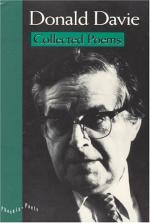|
This section contains 404 words (approx. 2 pages at 300 words per page) |

|
Donald Davie, in his new book [Ezra Pound], takes the Cantos very seriously, and tries to dispose of the ideological difficulties by separating the "opinions" from the "ideas" of the poem. He pleads, I think, that the appalling doctrines on politics and race belong to mere opinion or prejudice, and are not central to the meaning, but that Pound's ultimate values (justice, beauty, love, order)—not stated but embodied in processes of rapt vision arising from immediate experience—constitute the ideas or real meaning.
I put the analysis in my own words because Davie's account is troubled and obscure; he may well disagree with the paraphrase. But rather than study his terms and quarrel with his logic, I will make a single, literary comment: that if Pound built his poem as Davie indicates, it is a devastating mark of his failure that the poet's ear should have been...
|
This section contains 404 words (approx. 2 pages at 300 words per page) |

|


